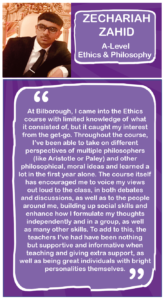Q: Do I need a GCSE in Religious Education or Religious Studies?
No, there is no need for any background in RE or RS to do this course. In fact, some of the best performing students we have had on this course had never taken these GCSEs. English Language and English Literature are much more important, as extended writing is crucial in this subject.
Q: Do I need to be religious to do this course?
Not at all! As long as you have a curiosity about philosophical, ethical, and theological matters, and an open mind, it doesn’t matter what your belief system is, if you have one at all. However, you will need to be willing to learn some extra background information about Christianity for Developments in Christian Thought if you are relatively unfamiliar with this faith.
Q: How is this subject assessed?
You will have three exams in June – one on Philosophy, one on Ethics, one on Developments in Christian Thought. Each exam is two hours long, and you will have to answer three 40-mark extended questions. There is generally approximately a week between each of the three exams. There is no coursework, there are no short-answer questions.
Q: Is there any choice about the units?
No – all units are compulsory, and equally weighted. So, you need to be willing and able to put full effort into Philosophy, Ethics, and Developments in Christian Thought.
Q: Do I have to buy anything for the course?
Whilst it is not necessary to purchase anything specifically for the course, we strongly recommend that every student buys the three revision guides (one for each unit) before starting the course. They are titled ‘My Revision Notes’ for OCR A-Level Religious Studies, published by Hodder Education. There is one for Philosophy, one for Ethics, and one for Developments in Christian Thought.
Q: Which modules will I study?
You will be taught Philosophy and Ethics and Developments in Christian Thought.
Q: Do you cover abortion?
No. Abortion is never covered in this course.
Q: Do you cover near-death experiences?
No. Near-death experiences are never covered in this course.

We hope that the FAQs and Subject Live chat have answered all your questions about the course. If you do have any other generic questions, please contact the course leader ashley.dean@bilborough.ac.uk
Please note that queries about your individual progression onto the course should be directed to admissions@bilborough.ac.uk
